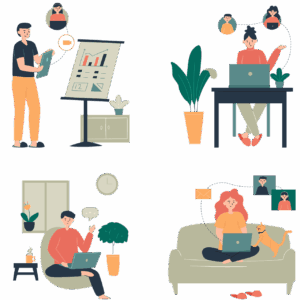The landscape of remote work is undergoing a profound transformation, driven by rapid advancements in artificial intelligence (AI) and automation technologies. By 2030, these innovations will not only redefine the way we work remotely but also revolutionize the skills required, the structure of organizations, and the global labor market. In this article, we explore the key roles AI and automation will play in shaping the future of remote work.
Automating Repetitive Tasks and Increasing Productivity
One of the most significant impacts of AI and automation on remote work is the automation of repetitive, low-value tasks. From scheduling meetings to data entry, chatbots and robotic process automation (RPA) tools are already streamlining workflows. By 2030, these technologies will become more sophisticated, enabling remote workers to focus on higher-value, creative, and strategic tasks that require human insight and emotional intelligence.
Enhancing Communication and Collaboration Tools
Remote work thrives on digital communication, and AI is set to make these tools more intuitive and efficient. AI-powered platforms will offer real-time language translation, smart meeting summaries, and automated note-taking, breaking down communication barriers across cultures and time zones. Additionally, virtual reality (VR) and augmented reality (AR), integrated with AI, will create immersive collaboration spaces, making virtual meetings feel more personal and engaging.
Personalized Workflows and Intelligent Assistance
AI-driven personal assistants will play an integral role in managing daily tasks for remote workers. These virtual assistants will anticipate needs, suggest optimal schedules, and help prioritize tasks based on real-time analytics. Personalized workflows, powered by machine learning algorithms, will adapt to individual working styles, promoting greater efficiency and work-life balance.
Redefining Skill Sets and Job Roles
As automation takes over routine tasks, remote workers will need to upskill to stay competitive. The demand for skills in AI management, data science, cybersecurity, and digital communication will surge. Soft skills such as adaptability, creativity, and emotional intelligence will also gain prominence, as these are areas where human capabilities surpass machines. Remote workers must embrace lifelong learning to navigate the evolving job market successfully.
Facilitating Global Talent Pools and Decentralized Workforces
AI-powered platforms for talent matching and project management will facilitate seamless connections between companies and remote professionals worldwide. This will lead to more decentralized workforces, allowing organizations to tap into diverse talent pools irrespective of geographical boundaries. Automation will also optimize resource allocation and project tracking, making remote team management more efficient and data-driven.
Addressing Ethical and Security Concerns
The rise of AI and automation in remote work raises important ethical and security considerations. Issues related to data privacy, algorithmic bias, and job displacement must be addressed proactively. Organizations will need to establish transparent AI policies, implement robust cybersecurity measures, and prioritize ethical AI development to build trust and safeguard the interests of remote workers.
Shaping the Future of Remote Work Culture
By 2030, AI and automation will not only influence the mechanics of remote work but also its culture. Companies will increasingly rely on AI to monitor productivity and employee well-being, raising questions about surveillance and autonomy. Balancing the benefits of AI-driven insights with respect for employee privacy will be critical to fostering a healthy, sustainable remote work culture.
The integration of AI and automation into remote work is inevitable and transformative. By 2030, these technologies will enhance productivity, enable new ways of collaboration, and redefine the skills required for success. Remote workers and organizations that proactively adapt to these changes will thrive in the evolving digital economy. As we move forward, a human-centered approach to deploying AI and automation will be essential to ensure that the future of remote work is inclusive, ethical, and empowering.




